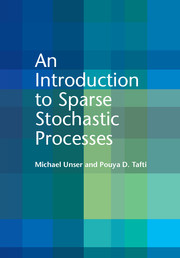Book contents
- Frontmatter
- Dedication
- Contents
- Preface
- Notation
- 1 Introduction
- 2 Roadmap to the book
- 3 Mathematical context and background
- 4 Continuous-domain innovation models
- 5 Operators and their inverses
- 6 Splines and wavelets
- 7 Sparse stochastic processes
- 8 Sparse representations
- 9 Infinite divisibility and transform-domain statistics
- 10 Recovery of sparse signals
- 11 Wavelet-domain methods
- 12 Conclusion
- Appendix A Singular integrals
- Appendix B Positive definiteness
- Appendix C Special functions
- References
- Index
8 - Sparse representations
Published online by Cambridge University Press: 05 September 2014
- Frontmatter
- Dedication
- Contents
- Preface
- Notation
- 1 Introduction
- 2 Roadmap to the book
- 3 Mathematical context and background
- 4 Continuous-domain innovation models
- 5 Operators and their inverses
- 6 Splines and wavelets
- 7 Sparse stochastic processes
- 8 Sparse representations
- 9 Infinite divisibility and transform-domain statistics
- 10 Recovery of sparse signals
- 11 Wavelet-domain methods
- 12 Conclusion
- Appendix A Singular integrals
- Appendix B Positive definiteness
- Appendix C Special functions
- References
- Index
Summary
In order to obtain an uncoupled representation of a sparse process s = L−1w of the type described in the previous chapters, it is essential that we somehow invert the integral operator L−1. The ideal scenario would be to apply the differential operator L = (L−1)−1 to uncover the innovation w that is independent at every point. Unfortunately, this is not feasible in practice because we do not have access to the signal s(r) over the entire domain r ∈ ℝd, but only to its sampled values on a lattice or, more generally, to a series of coefficients in some appropriate basis. Our analysis options, as already alluded to in Chapter 2, are essentially twofold: the application of a discrete version of the operator, or an operator-like wavelet analysis.
This chapter is devoted to the in-depth investigation of these two modes of representation. As with the other chapters, we start with a concrete example (Lévy process) to lay down the key ideas in Section 8.1. Our primary tool for deriving the transform-domain pdfs is the characteristic functional, reviewed in Section 8.2 and properly extended so that it can handle arbitrary analysis functions φ ∈ Lp(ℝd). In Section 8.3, we investigate the decoupling ability of finite-difference-type operators and determine the statistical distribution of the resulting generalized increments. In Section 8.4, we show how a sparse process can be expanded in a matched-wavelet basis and provide the complete multivariate description of the transform-domain statistics, including general formulas for the wavelet cumulants.
- Type
- Chapter
- Information
- An Introduction to Sparse Stochastic Processes , pp. 191 - 222Publisher: Cambridge University PressPrint publication year: 2014



